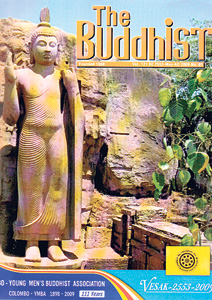The Colombo YMBA has been in existence for the past 111 years. Way back in 1898, a group of young Buddhists led by C.S. Dissanayake, a Roman Catholic, who later became a Buddhist by conviction, met at the BTS (Buddhist Theosophical Society) office at Maliban Street, Pettah and decided to form the Young Men's Buddhist Association "for the study and discussion of Buddhism and its practical observance". It was incorporated as the Colombo YMBA in 1921 after similar associations were formed in other towns.
'The Buddhist', the YMBA publication records a brief history in this year's Vesak issue and pays tribute to the early office-bearers starting with Sir Baron Jayatilaka, then Vice-Principal of Ananda College who was invited to be the first President. It is an act of gratitude – the subject of Rajah Kuruppu's editorial which describes gratitude as a rare noble virtue. Mr. Kuruppu boldly says that generally by nature people are not grateful, so it is a noble quality to cultivate.
The near 200-page journal is a well thought out publication with a host of articles from well known Buddhist leaders - both the clergy and the laity – giving the reader enough material to read and reflect upon not merely during Vesak but on a regular basis. Editor Kuruppu has selected a number of articles from early issues of 'The Buddhist' by renowned writers thus providing a fine mix of both the present and the past. Here too the editor is continuing his theme of gratitude.
These days, it's not often that one gets an opportunity to read Ven. Narada Thera whose article on 'The Path of Purity' (September1937 issue) is thought provoking. He explains the three stages of the Path – Morality ('Sila'), Concentration ('Samadhi') ad Wisdom ('Panna').
In his succinct style, Ven. Narada Thera goes on to describe how though both discipline and concentration are helpful to clear the Path of its obstacles, it is insight ('Vipassana Panna') alone which enables one to see things as they truly are, and consequently reach the Ultimate Goal by annihilating the passions inhibited by 'Samadhi'.
Discussing the code of conduct laid down by the Buddha for the laity, late I.B. Horner (October 1947) quotes the Buddha who makes it clear to the householder Potaliya that onslaught on creatures, stealing, lying, malicious speech, coveting, angry blame, wrathful rage and pride are all fetters and hindrances, from which the Ariyan should restrain himself.
He sums up the Suttanipata, where the layman is reminded that he would suffer if he has bad friends, is indolent, does not support his parents when they are old, if he is proud of his birth and riches but ashamed of his relations, if he squanders his savings on women, drink and gambling, or if he runs after other men's wives.
In between the articles, an interesting advertisement taken from the May 1936 issue appears where the annual subscriptions for 'The Buddhist' (edited by Sir Baron Jayatilaka & Vincent de Silva) are mentioned as Rs 3 for Ceylon, India and Burma, and six shillings for other countries. Members were reminded that those who were not in arrears would get the copies free. And then there was a gentle reminder that "punctual payment will help the member and management". The journal has been identified as "the oldest English journal of the Buddhist" in existence since 1888 – ten years before the YMBA was established.
As for current contributors, Bhikkhu Bodhi writing on 'The Problem of Conflict' – a much discussed topic these days – reminds us that it is one of the bitterest ironies of human life that although virtually all human beings cherish a desire to live in peace, we continually find ourselves embroiled in conflict, pitted against others in relationships marred by tension, distrust or open hostility.
Ven Henepola Gunaratana Thera advises that people suffering from the sickness of greed, hatred, delusion, jealousy, fear, tension, anxiety, and worry should use the Dhamma medicine mindfully.
"Medicine is not always pleasant tasting, sometimes it is bitter. Even wholesome Dhamma medicine is not pleasing to people suffering from defilements. Truth is bitter as long as you are obsessed with defilements, but for the Buddha, truth was sweet. He once said that it is the sweetest among all the sweet things in the world and the life of highest quality is the life lived with wisdom," he says.
'Developing faith in the Buddhist Path to Enlightenment' by Ajahn Brahmavamso, 'Meditation in daily life' by Ven. Olande Ananda (Sir Baron Jayatilaka memorial oration), 'The Buddhist psychology of ideologies' by Professor Y. Karunadasa (address at the Fourth National Conference on Buddhist Studies), and 'The Rationality of the Buddha Dhamma' by Asoka Devendra are among other articles.
The pictorial content is limited to activities of the YMBA but a few more of general interest would have made the publication brighter and more interesting.
Editor Kuruppu has done a good job putting in a lot of effort planning a quality publication in keeping with the traditions of an organization which boasts of over a century of existence. |

